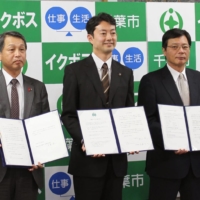Chiba – While the government is struggling to raise the rate at which civil employees take paternity leave, in one municipal office over nine out of 10 eligible workers have taken time off for child-rearing following a change in mindset.
Public employees often feel obliged to continue work instead of taking paternity leave, but not at the Chiba city office, where former Mayor Toshihito Kumagai took charge of promoting awareness of work-family balance and trained managers to show more flexibility toward their subordinates.
“I needed the courage to take five months off, but the time was precious as I could watch my baby grow,” Chiba city employee Takahiro Sano, 38, said, recalling his paternity leave from November 2018 to March 2019.
Sano decided to take the time off when his wife, who also works, gave birth to their third child. He continues to make breakfast for his family and takes his children to school in the morning.
Employees of the Chiba city office are fortunate that, thanks to the former mayor, their bosses show understanding, making it easier to either shorten their working hours or take leave to raise children — something they now can do without hesitation, Sano added.
Of male civil servants employed by the Chiba municipal government, 12.6% took child care leave in the fiscal year ending in March 2017. But starting the following year, bosses began asking their employees why they hesitated to take leave, opening the door to a new mindset.
As a result, the number of those who decided to take paternity leave has been steadily climbing, reaching 28.7% of eligible employees in fiscal 2017, 65.7% in fiscal 2018, and 92.3% in fiscal 2019.
Showing just how enthusiastically Chiba city’s workers have embraced taking time off, among government ordinance cities with a population of at least 500,000, Fukuoka trailed a distant second at just 20.2% in 2019.
Chiba municipal government employees feel psychologically emboldened by the fact that taking paternity leave has come to be widely practiced, with one of the reasons being that “workers have to think of an argument for not taking it,” said an official in charge.
Kumagai, 43, for his part, repeatedly stressed the need for taking paternity leave while serving as the city’s mayor, adopting a declaration that all managerial staff must show strong support for paternity childcare. The former mayor, who used to take his two children to nursery and collect them every day, was elected governor of Chiba Prefecture in March.
According to a survey by Mitsubishi UFJ Research and Consulting Co., in many cases, male workers decline to take time off for the birth or raising of their child because there is a distinct “atmosphere against doing so in the workplace” or because they wish to “avoid getting a pay cut.”
The Chiba city office, however, maintains that if reasons for an employee’s reluctance to take paternity leave are clear, it can introduce measures such as childcare allowances or monetary support from the employees’ mutual aid society to make up any shortfalls an employee might experience while on leave.
Of Japan’s 47 prefectural governments, Tottori topped the paternity leave rankings in fiscal 2019 with 26.1% of its employees taking time off, up sharply from the previous year’s 7.3%.
In particular, the level soared to 56.6% from 6.0% in the prefectural police department, which issued a notice encouraging police officers with infants under 1 year old to take more than two weeks off whenever possible.
“No one took paternity leave several years ago because none of us considered it possible,” a Tottori government official said. But employees have begun to take time off for childcare “probably because they now recognize the seriousness of top officials in actually promoting it,” he said.
In fiscal 2019, only 8.0% of local government employees took paternity leave overall, much lower than the target of 13.0% to be achieved by fiscal 2020 set by the central government.
The irony is that Japan offers one of the most generous paternity leave packages in the world, featuring exceptionally long leave and benefits, according to Tetsuya Ando of Fathering Japan, a nonprofit promoting men’s participation in child-rearing. Despite this, breaking cultural norms has proven a big hurdle.
Japan needs to create a climate so that “men can recognize that their workplace keeps going even when they are not there and that taking paternity leave is meaningful,” Ando said.
In a time of both misinformation and too much information, quality journalism is more crucial than ever.
By subscribing, you can help us get the story right.
SUBSCRIBE NOW



